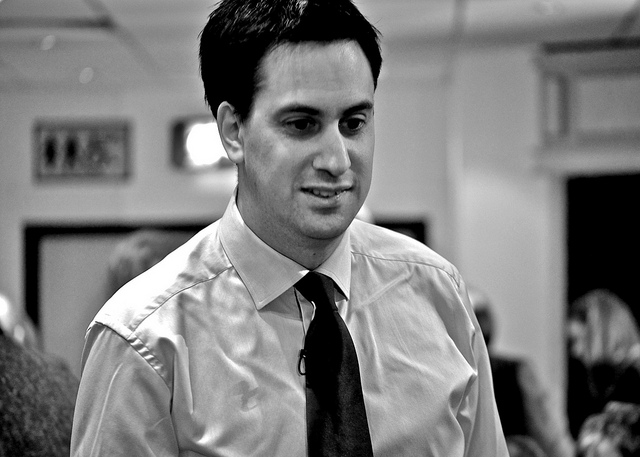The 2015 election was won and lost on brands, messages, and leaders rather than policy
With the General Election now firmly behind us, we are beginning to gain a better sense of what it was that proved decisive when the votes were counted on the night of Thursday May 5th, and the Conservatives gained their first majority government since 1992. Rafael Malek shares research from BritainThinks which shows that national level concerns, party ‘brand’ and leadership all played their part in consigning Labour to a second consecutive election defeat.

Credit: plashing vole, CC BY NC SA 2.0
Against a backdrop of largely static national polls, BritainThinks conducted a research programme over the course of the election campaign that sought to dig deeper and uncover what was driving voting intention. Collaborating with The Guardian, we designed a project that was neither quantitative, purely ‘researcher-led’ (in the sense of the research being conducted in an artificial setting with a researcher asking questions), nor national-level. Instead, we designed it to be qualitative, largely ‘voter-led’, and local.
We selected five key marginal constituencies, each representing a wider ‘battle’ being played out across the country: Taunton Deane, Ealing Central & Acton, Glasgow East, Dewsbury, and Thanet South. We recruited a panel of twelve voters in each, selected to be broadly reflective of the wider constituency in terms of 2010 voting history and demographics. All of our panellists declared themselves certain to vote – but were, at the beginning of the project, undecided about who to vote for.
Each of our participants was equipped with a smartphone app and set a number of tasks (the minority of participants without smartphones used tasks adapted to email/paper instead). Primarily, they were instructed to keep an ‘election diary’: every time they had a thought about the election, they used an intuitive app feature to notify us what triggered the thought and what it made them feel. This allowed us to understand what swing voters noticed and what they were thinking over the course of their daily lives during the campaign, without an artificial setting or leading questions.
Additionally, participants were asked to complete a short weekly survey, which tracked engagement and voting intention, as well as being tasked with a small number of specific missions, such as interviewing a friend about the election or watching one of the televised leaders’ debates. We also conducted three traditional focus groups with our panel in each location over the course of the campaign, allowing us to explore in more depth their perceptions of the parties, leaders and policies.
As well as developing our understanding of voters’ perceptions of the individual parties, their ‘brands’ and leaders, the project provided some insights into how undecided voters make up their minds as to who to vote for, come election day. What follows is an overview of the latter:
This election was all about national-level concerns
All of our participants, living in key marginal constituencies, recalled receiving campaign leaflets through the post, while many were directly canvassed by candidates or party members. It would seem, however, that it was primarily party messages at the national-level which made a lasting impression. Of the 444 spontaneous election diary entries, only 12% referenced local issues, candidates or campaigns. Similarly, when surveyed at the end of the project, almost four-fifths of our panellists claimed to have voted for the national party rather than the local candidate.
Qualitative findings from the focus groups suggested that local campaigns and candidates could make a difference: swing voters in Taunton Deane, for example, claimed to be more likely to vote for the Lib Dems had the popular outgoing MP Jeremy Browne been running for re-election. It was clear that, across the five constituency panels, this was the exception and that, in this particular election, the national trumped the local.
The policy offers were less important than the parties’ brands, key messages and leaders
When asked directly in the focus groups, participants would resolutely state that policies were the most important determinant of their vote. However, most of our panellists hadn’t read a single party’s manifesto and the number of specific policies that they were able to name was limited. Indeed, only around a quarter of election diary entries were related (even remotely) to specific policy areas; of these, the vast majority regarded, broadly, the economy.
It is clear from the research that policies play a much smaller role in influencing undecided voters than they state explicitly. One other influence was a party’s overall ‘brand’ or reputation. Our Glasgow East panel, for example, ended the project strongly preferring the SNP over Labour, despite only being able to point to 1-2 policy differences between the two. Instead, it was the SNP’s perceived understanding of local people and representation of Scottish interests that mattered. Other prominent influences that came through very clearly over the course of the project were clarity (and simplicity) of message and perceived competence and authoritativeness of party leaders.
The short campaign was more about confirmation than persuasion
As was clear from the first wave of focus groups, conducted at the beginning of the project, most of our undecided voters had perceptions of party policies, brands, message and leaders before the campaign begun. Most also had preferences, albeit weak ones. Interestingly, despite intensive campaigning and continuous media coverage, these did not shift much in the months leading up to the election.
Instead, the campaigning they were exposed to left them confused rather than enlightened. Many diary entries expressed frustration at the conflicting, unreliable and/or technical information they were being bombarded with. “I feel quite confused about how the newspapers have been acting… [F]or someone who is undecided, it can be confusing not knowing who is giving the correct info”, said Dennis in Glasgow East. “The more you read, the less you know”, said Paul in Taunton Deane, “It’s all general, there’s no meat on the bone.”
One way of dealing with the election noise was to simply ignore it: our panellists did not notice much of the campaign (despite possibly being more engaged than they would have been had they not been taking part in the project). For example, in the first week of the short campaign, media attention was focused on Parliament dissolving, Liberal Democrats pledging an extra £2.5bn on mental health services, an open letter in support of the Conservatives signed by one-hundred business leaders, the seven-way leaders’ debate, the leaked Sturgeon memo, a constituency poll putting Farage behind in Thanet South, and much else besides. Our panellists’ election diary entries did not reflect this, however, with some relating to the seven-way leaders’ debate, some generic comments about the NHS, and an entry regarding couple from Scunthorpe who won the lottery for the second time.
Participants processed the election noise that they did notice by using their pre-existing perceptions as filters: new information consistent with these perceptions was used to confirm them, while inconsistent information was disregarded. Labour’s promised ‘deficit lock’ is a prime example. Our Glasgow East panel, increasingly leaning toward the SNP, all noticed the announcement and added it to their body of evidence that Labour were just another pro-austerity party. Most of our English voters, sceptical about Labour’s economic credibility, just dismissed the announcement. “I just don’t think austerity would be dealt with effectively enough by Labour and I don’t think they would keep their promise”, said one.
—
You can find extensive fieldwork notes from each focus group, a daily summary note of mobile diary entries, media coverage, and much more at www.britainthinks.com/battleground-britain. This post represents the views of the author and not those of Democratic Audit or the LSE. Please read our comments policy before posting
—
 Raphael Malek has been Senior Research Executive at BritainThinks since September 2012, and has since worked on a variety of projects involving quantitative, qualitative and deliberative research methods. Clients have included Barratt London, Victim Support, Cuadrilla Resources, Museums Association and British Future. Prior to joining BritainThinks, Raphael completed an MA in Public Policy from King’s College, London and an undergraduate degree in Law from the University of Oxford.
Raphael Malek has been Senior Research Executive at BritainThinks since September 2012, and has since worked on a variety of projects involving quantitative, qualitative and deliberative research methods. Clients have included Barratt London, Victim Support, Cuadrilla Resources, Museums Association and British Future. Prior to joining BritainThinks, Raphael completed an MA in Public Policy from King’s College, London and an undergraduate degree in Law from the University of Oxford.





 Democratic Audit's core funding is provided by the Joseph Rowntree Charitable Trust. Additional funding is provided by the London School of Economics.
Democratic Audit's core funding is provided by the Joseph Rowntree Charitable Trust. Additional funding is provided by the London School of Economics.
@malc_fisher @KeithBunting007 Perhaps read this? https://t.co/Gq6VGtRfIQ
So parties create (or have created for them by the media) an overall position or image. People then filter their perception as to whether or not a particular policy fits into their perception and ignore anything else. This suggests that only small changes in voting intention occur within the short campaign and the real battle is to turn intention into actual voting.
This was where the Tories ‘gamed’ the election. By concentrating all their financial resources in 80 constituencies and almost completely ignoring the other 570 they were able to increase turnout in enough places where a small swing would result in the win (or successful defence) of a constituency.
So, under First Past The Post, 600,000 people decided the election and the rest of us millions are taken for granted.
Is this the end for First Past The Post?
aleixcuberes: Lideratges, missatges, marques partit i percepcions determinaren #GE2015
https://t.co/MEw0Cs1cL1… https://t.co/8EL3xdZhpb
Lideratges, missatges, marques partit i percepcions determinaren #GE2015
https://t.co/tK9L7YbidT via @democraticaudit
#recomanar #mustread
The 2015 election was won and lost on brands, messages, and leaders rather than policy https://t.co/0pk3KKM4FF
What about NZ?
Vital reading Rt @PJDunleavy The 2015 election was won and lost on brands, messages, and leaders rather than policy https://t.co/5yo4uNcwNZ
The 2015 election was won and lost on brands, messages, and leaders rather than policy https://t.co/nepdieu7ys #ge2015 reflections
The 2015 election was won and lost on brands, messages, and leaders rather than policy
Check it out @ajaykisgroup
https://t.co/ulMZLUuwI5
[…] The 2015 election was won and lost on brands, messages, and leaders rather than policy. With the General Election now firmly behind us, we are beginning to gain a better sense of what it was that proved decisive when the votes were counted on the night of Thursday May 5th, and the Conservatives gained their first majority government since 1992. […]
Very interesting research here, exploring what voters actually noticed and how they made up their minds for GE2015: https://t.co/oWmXCEMKFG
The 2015 election was won and lost on brands, messages, and leaders rather than policy https://t.co/3Fj4wf1nJj
`The 2015 election was won and lost on brands, messages, and leaders rather than policy` https://t.co/G1S0uwDNDM @democraticaudit
The 2015 election was won and lost on brands, messages, and leaders rather than policy https://t.co/EPAjNOvSE7 #Option2Spoil
The 2015 election was won and lost on brands, messages, and leaders rather than policy – via @democraticaudit https://t.co/DBJYt6YXr1
The 2015 election was won and lost on brands, messages, and leaders rather than policy https://t.co/Xt7ItaEJ3u https://t.co/GrrpyGSAsF